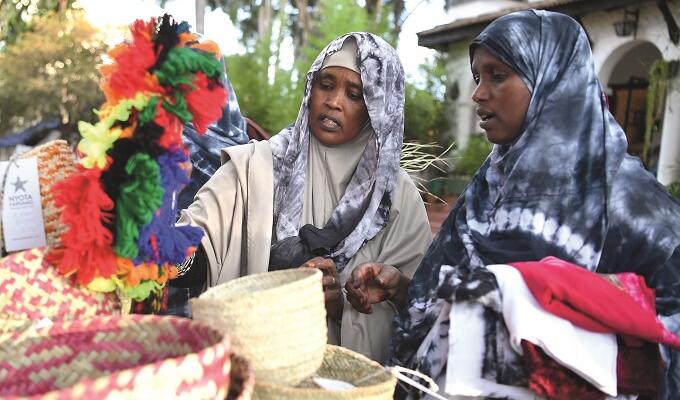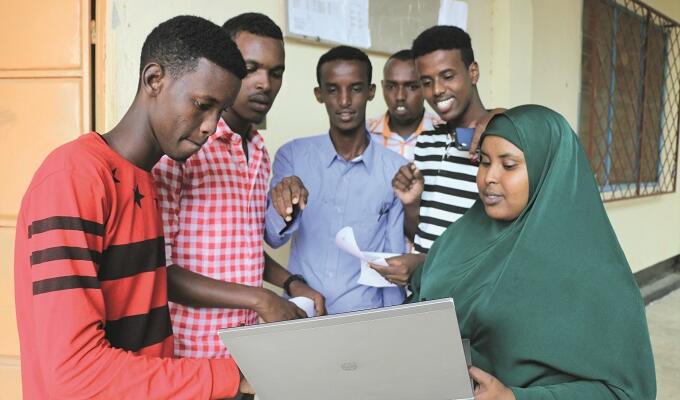


Stories
Leveraging technology and trade to create jobs for refugees and host communities in Kenya
1 July 2019
The challenge
Displacement crises have now become a fixture on the global political landscape. The numbers of people forcibly displaced from their homes remain at historic highs: 68.5 million people, according to UNHCR, the United Nations refugee agency – over 25 million of them across borders as refugees.
Close to 85% of the world’s displaced people are in developing countries, living among communities that, in material terms, may be scarcely better off. Moreover, over half of the world’s refugees are in so-called ‘protracted’ situations where they have been in exile in an asylum country for more than five years. Some 6.5 million refugees have been in exile for longer than 10 years.
The scope and duration of current displacement situations have tested the limits of policy and practice that often date back to the post-1945 era. For instance, humanitarian agencies have typically offered literacy, basic schooling and vocational training in areas such as tailoring, carpentry, and in recent years, information technology. But such skills-building work has typically occurred in isolation from labour markets.
Connecting skills to real market demand creates opportunities for displaced people to earn incomes and build expertise and experience that would better equip them to be effective economic actors, whether back home or in a resettlement country.
Tapping into international markets can play a useful role in generating economic opportunities in displacement settings. This is true for physical merchandise like clothes and furniture. But it is especially true for services. The internet has made it possible for many types of service sector work to be done remotely. Through online platforms such as Upwork, Freelancer and Fiverr, companies can break down a given job into a series of tasks and invite individual freelance workers around the world to submit bids to perform each one. In principle, workers in a refugee camp need nothing more than a decent internet connection to bid for jobs like data entry, transcription and writing. In reality, submitting competitive bids requires skills, knowledge and practice.
The response
ITC’s Refugee Employment & Skills Initiative has been working in two major refugee complexes in Kenya to enable refugees and host communities to tap into international markets for home décor goods and freelance digital services. Feasibility studies identified those two sectors as having high market potential, particularly for clients that place a premium on social impact.
Together with the Norwegian Refugee Council and other partners, ITC offered skills training combined with support for business development and connecting to markets.
In Dadaab, home to close to a quarter-million refugees from Somalia, the initiative kicked off in May with a digital training and mentorship programme. Over five months, Samasource Digital Basics, the Nairobi office of a San Francisco-based non-profit that teaches digital skills to people without traditional paths to employment, trained about 100 participants in internet research, word processing, translation and spreadsheet capabilities. It also coached them on how best to present themselves to potential employers on freelancing platforms.
Samasource and ITC provided follow-up support and professional skills mentorship. For home décor, Tosheka Textiles, a Kenyan social enterprise specializing in textile production, provided training to a group of artisans – most of them women – on product development. Experts from Goodies African Interiors & Gifts and Afrika Handmade, two Nairobi-based home décor retailers, worked with the artisans on business and client management before working to help them break into markets in Nairobi and beyond.
Later in the year, ITC piloted a similar project, focused on digital skills, in another settlement complex – Kakuma, in northwestern Kenya, with over 180,000 refugees and asylum seekers, many of them from South Sudan. GrowthBond, a digital marketing and financial services firm, led the training work, which also covered internet marketing in an attempt to match participants’ creative talents with freelance market demand. ITC led business and entrepreneurship development and mentorship workshops for both freelancers and local businesses. Upwork, a leading online work platform, ran a five-week freelancing bootcamp, during which participants interacted with clients, bid for jobs, learned how to improve their profiles and earned small incomes.
The results
Training and market connections have turned into income opportunities for people in both Dadaab and Kakuma. In both places, online freelancers have successfully bid for online contracts. Seventy of the 83 freelancers trained in Dadaab have come together as the Dadaab Collective, offering services including data collection and entry, technical writing, translation and transcription. Half of them have secured work, earning over $3,000.
Course participants in Kakuma have already earned hundreds of dollars from successful online bids for tasks such as designing Facebook and Instagram advertisements during the training activities and follow-up. In a competition set up by ITC and GrowthBond to incentivize continued engagement after the course, six freelancers won cash prizes based on the number of bids they made, the money they earned, and the ratings their work received, giving them funds to start their small businesses.
In the home décor sector, the 50 artisans ITC worked with in Dadaab have organized into a collective called Nyota Farsamo, from the Swahili word for ‘star’ and the Somali word for ‘artisan.’ The business now works with distributors in Nairobi, and earned over $2,800 from selling woven and plaited baskets to buyers in Nairobi and tie-dye scarves that a Canadian company is using as corporate gifts. Subsequent sales have further boosted revenue and incomes for the artisans in Dadaab.
The future
ITC will continue to support the online freelancers in Dadaab and Kakuma, as well as the artisan collective in Dadaab, to strengthen their businesses and build connections to new clients.
Looking ahead, ITC is exploring how to deliver trade-led, market-based solutions in displacement settings in Ethiopia, Somalia and Uganda.
Displacement crises have now become a fixture on the global political landscape. The numbers of people forcibly displaced from their homes remain at historic highs: 68.5 million people, according to UNHCR, the United Nations refugee agency – over 25 million of them across borders as refugees.
Close to 85% of the world’s displaced people are in developing countries, living among communities that, in material terms, may be scarcely better off. Moreover, over half of the world’s refugees are in so-called ‘protracted’ situations where they have been in exile in an asylum country for more than five years. Some 6.5 million refugees have been in exile for longer than 10 years.
The scope and duration of current displacement situations have tested the limits of policy and practice that often date back to the post-1945 era. For instance, humanitarian agencies have typically offered literacy, basic schooling and vocational training in areas such as tailoring, carpentry, and in recent years, information technology. But such skills-building work has typically occurred in isolation from labour markets.
Connecting skills to real market demand creates opportunities for displaced people to earn incomes and build expertise and experience that would better equip them to be effective economic actors, whether back home or in a resettlement country.
Tapping into international markets can play a useful role in generating economic opportunities in displacement settings. This is true for physical merchandise like clothes and furniture. But it is especially true for services. The internet has made it possible for many types of service sector work to be done remotely. Through online platforms such as Upwork, Freelancer and Fiverr, companies can break down a given job into a series of tasks and invite individual freelance workers around the world to submit bids to perform each one. In principle, workers in a refugee camp need nothing more than a decent internet connection to bid for jobs like data entry, transcription and writing. In reality, submitting competitive bids requires skills, knowledge and practice.
The response
ITC’s Refugee Employment & Skills Initiative has been working in two major refugee complexes in Kenya to enable refugees and host communities to tap into international markets for home décor goods and freelance digital services. Feasibility studies identified those two sectors as having high market potential, particularly for clients that place a premium on social impact.
Together with the Norwegian Refugee Council and other partners, ITC offered skills training combined with support for business development and connecting to markets.
In Dadaab, home to close to a quarter-million refugees from Somalia, the initiative kicked off in May with a digital training and mentorship programme. Over five months, Samasource Digital Basics, the Nairobi office of a San Francisco-based non-profit that teaches digital skills to people without traditional paths to employment, trained about 100 participants in internet research, word processing, translation and spreadsheet capabilities. It also coached them on how best to present themselves to potential employers on freelancing platforms.
Samasource and ITC provided follow-up support and professional skills mentorship. For home décor, Tosheka Textiles, a Kenyan social enterprise specializing in textile production, provided training to a group of artisans – most of them women – on product development. Experts from Goodies African Interiors & Gifts and Afrika Handmade, two Nairobi-based home décor retailers, worked with the artisans on business and client management before working to help them break into markets in Nairobi and beyond.
Later in the year, ITC piloted a similar project, focused on digital skills, in another settlement complex – Kakuma, in northwestern Kenya, with over 180,000 refugees and asylum seekers, many of them from South Sudan. GrowthBond, a digital marketing and financial services firm, led the training work, which also covered internet marketing in an attempt to match participants’ creative talents with freelance market demand. ITC led business and entrepreneurship development and mentorship workshops for both freelancers and local businesses. Upwork, a leading online work platform, ran a five-week freelancing bootcamp, during which participants interacted with clients, bid for jobs, learned how to improve their profiles and earned small incomes.
The results
Training and market connections have turned into income opportunities for people in both Dadaab and Kakuma. In both places, online freelancers have successfully bid for online contracts. Seventy of the 83 freelancers trained in Dadaab have come together as the Dadaab Collective, offering services including data collection and entry, technical writing, translation and transcription. Half of them have secured work, earning over $3,000.
Course participants in Kakuma have already earned hundreds of dollars from successful online bids for tasks such as designing Facebook and Instagram advertisements during the training activities and follow-up. In a competition set up by ITC and GrowthBond to incentivize continued engagement after the course, six freelancers won cash prizes based on the number of bids they made, the money they earned, and the ratings their work received, giving them funds to start their small businesses.
In the home décor sector, the 50 artisans ITC worked with in Dadaab have organized into a collective called Nyota Farsamo, from the Swahili word for ‘star’ and the Somali word for ‘artisan.’ The business now works with distributors in Nairobi, and earned over $2,800 from selling woven and plaited baskets to buyers in Nairobi and tie-dye scarves that a Canadian company is using as corporate gifts. Subsequent sales have further boosted revenue and incomes for the artisans in Dadaab.
The future
ITC will continue to support the online freelancers in Dadaab and Kakuma, as well as the artisan collective in Dadaab, to strengthen their businesses and build connections to new clients.
Looking ahead, ITC is exploring how to deliver trade-led, market-based solutions in displacement settings in Ethiopia, Somalia and Uganda.




